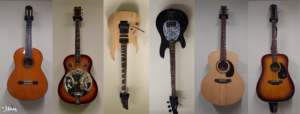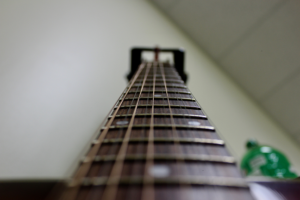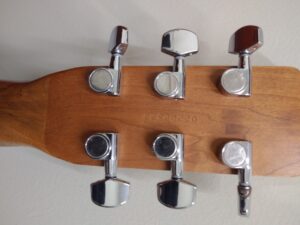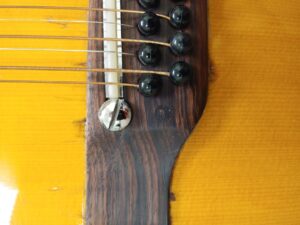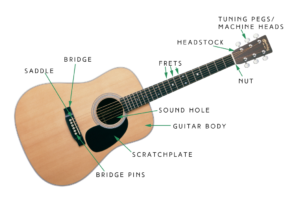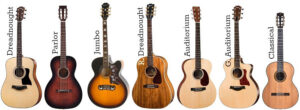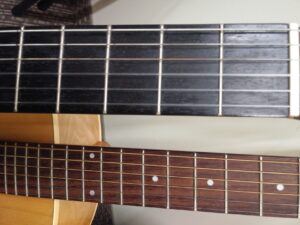While it’s true that you can begin to learn on pretty much any instrument, and while it’s also true that you need to get pretty good before you can truly tell the difference in quality between different guitars, it’s also true that a guitar is a very personal thing. You need to like both the sound and the feel if you are going to enjoy playing it. Maybe, though, you don’t want to spend a fortune on an instrument before you know whether or not you (or your child) are going to stick with it. Here are some tips to help you choose.
My Uncle Has an Old One Sitting in His Basement
This might be a great way to get started, but there are a few things that you are going to have to check if you want to start with a used guitar.
- Is the neck straight? A warped neck is not something than can be fixed.
- Does it stay in tune? Make sure the tuning pegs don’t “slip”. Machine heads are generally more durable.
- How close are the strings to the neck? This is called the “action”. If the strings are too far away, it will be hard to “push”. If they are too close, they will “buzz” when you play.
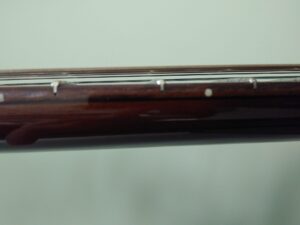
- Does the bridge show signs of lifting, or are the pegs loose? Both of these are major problems that can be expensive to fix.
If all of these things seem fine, take the used guitar to your local music shop and have them put on new strings. Then you’re ready to get started!
I need to Buy a Guitar, but How Do I Choose?
You really want to do this in person. The most important things to consider are the sound and the feel. Have someone at the store play it for you. Hold on to it and make sure you can comfortably reach all of the parts:
Can your right hand comfortably sit over the sounding hole without having to reach around the body with your shoulder? Can your left hand reach the nut without stretching? Can your fingers reach all the way up to the thick string while keeping your thumb behind the neck?
There are a lot of different things to consider when choosing a guitar, many of which affect the price. As with a used guitar, you want to check the action and the tuning pegs, but there are a few other factors to think about:
Brand
Although we are usually more comfortable going with a brand we recognize, a good starter guitar does not have to be a brand name. In order to make “affordable” instruments, the larger manufacturers will often use poorer quality materials. It is often possible to get a better-quality instrument at a similar price by going with a smaller company. If you are interested in buying Canadian, we have some wonderful guitar manufacturers in every part of the country. I have both a Norman and a Seagull, both of which are part of the Godin family of amazing instruments produced in Quebec.
Wood and Finish
Different types of woods produce different sounds. Cedar and mahogany are used on the more affordable guitars. The wood on the top of the guitar has the greatest impact on the quality of the sound. A laminate top rather than a solid top will not vibrate quite as well, but is an excellent affordable option. A satin finish, although not as shiny, is also more affordable than a lacquer.
At the beginner level, you want a good quality instrument, but having an expensive guitar doesn’t make playing any easier. Higher level instruments are designed for high-level players who want the ultimate in sound. In the beginning, you won’t have a clear idea of the sound, style or type of guitar you will ultimately want to play, so stay within your budget. If it doesn’t sound significantly better to you, it isn’t worth the significant increase in price.
Body Type
Guitar bodies vary in size, shape and thickness, all of which affect the sound. There is an overwhelming range in types and styles, and it’s difficult to know where to begin. The most common shape is the dreadnought.
The goal as a beginner is to establish good posture so that you don’t end up with shoulder tendonitis as an adult. You need to choose one that “fits”. Definitely stay away from the Jumbo. Unless the student is less than 8 years old, there shouldn’t be a need to buy a 3/4 or reduced-size instrument, especially with such a wide range in body sizes and thicknesses. Features like the notch in the body can be an extra expense. It is there to allow you to easily play all the way up the neck, so not necessary at the beginner level.
Acoustic versus Electric
Although the type of guitar you choose may depend on the type of music you want to play, we recommend starting with an acoustic guitar. The most important reason is posture … the electric guitar is meant to be a performance instrument played standing up, so it can be much harder to establish good posture while sitting down. It is also much heavier and requires the additional purchase of an amp. Many beginner students find it difficult to get a clean, clear sound on an electric guitar. Remember that once you learn to play properly, you can transfer your skills to any instrument. Many teachers believe that if you initially learn to play on an acoustic instrument you will be a better guitar player.
The Guy At The Store Told Me That I Should Buy a Classical Guitar If I’m a Beginner
Some people recommend starting with a classical guitar because the body tends to be smaller, and because they believe that the nylon strings on a classical guitar will be easier to “push” than the metal ones on a standard acoustic guitar. That’s not always true. If the action on the classical guitar is too high, it will still be hard to play. I can guarantee that when you start, your fingers are going to hurt no matter what guitar you choose.
The other concern is that the classical guitar has a much wider neck which makes the upper strings much harder to reach, especially for smaller hands.
If you love classical guitar music, and that is what you want to learn to play, then absolutely, but if that isn’t the case, it probably isn’t your best choice.
Better By the Dozen
Unlike a piano, where the first one you buy is usually the only one you ever get, I’ve never met an avid guitar player who only owns one instrument. My personal collection is 10 guitars and counting.
Don’t Forget to Have Fun
The guitar is a versatile, portable, gregarious instrument. Playing guitar is a great way to make friends or make money. From campfires to concert halls, classical music to contemporary, there’s a world of amazing experiences to be had when you play the guitar.

